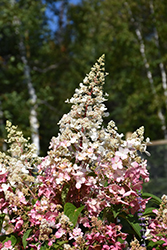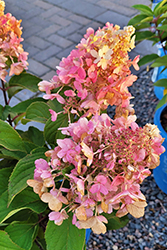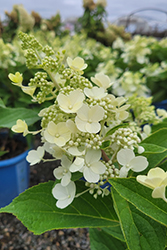>> Home
Candelabra™ Hydrangea
Hydrangea paniculata 'Hpopr013'
Height: 6 feet
Spacing: 4 feet
Sunlight:
![]()
![]()
Hardiness Zone: 3b
Brand: Bloomin' Easy
Description:
Outstanding, large, candle shaped flower heads emerge white, blush pink, then transition slowly to bright red as the summer fades; strong, deep red stems carry the blooms all season, then provide winter interest; perfect for borders or around patios
Ornamental Features
Candelabra™ Hydrangea features bold conical white flowers with pink overtones at the ends of the branches from mid summer to late fall. The flowers are excellent for cutting. It has green deciduous foliage. The pointy leaves do not develop any appreciable fall color. The smooth gray bark and dark red branches add an interesting dimension to the landscape.
Landscape Attributes
Candelabra™ Hydrangea is a multi-stemmed deciduous shrub with an upright spreading habit of growth. Its relatively coarse texture can be used to stand it apart from other landscape plants with finer foliage.
This shrub will require occasional maintenance and upkeep, and is best pruned in late winter once the threat of extreme cold has passed. It has no significant negative characteristics.
Candelabra™ Hydrangea is recommended for the following landscape applications;
- Accent
- Mass Planting
- General Garden Use
Planting & Growing
Candelabra™ Hydrangea will grow to be about 6 feet tall at maturity, with a spread of 5 feet. When grown in masses or used as a bedding plant, individual plants should be spaced approximately 4 feet apart. It tends to be a little leggy, with a typical clearance of 1 foot from the ground, and is suitable for planting under power lines. It grows at a medium rate, and under ideal conditions can be expected to live for 40 years or more.
This shrub does best in full sun to partial shade. It prefers to grow in average to moist conditions, and shouldn't be allowed to dry out. It is not particular as to soil type or pH. It is highly tolerant of urban pollution and will even thrive in inner city environments. Consider applying a thick mulch around the root zone in winter to protect it in exposed locations or colder microclimates. This is a selected variety of a species not originally from North America.


